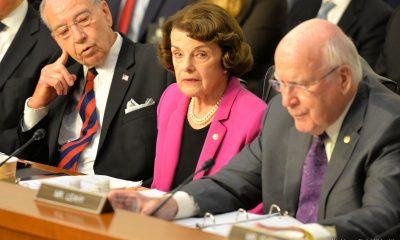National
Incumbents hope LGBT support boosts chances
Murphy, Gillibrand have advantages in re-election bids

Is going gay good for your re-election prospects?
Rep. Patrick Murphy (D-Pa.) and Sen. Kirsten Gillibrand (D-N.Y.) are among the incumbents seeking re-election hoping that their support of LGBT rights will translate to campaign donations and victory in November.
Both lawmakers championed repeal of “Don’t Ask, Don’t Tell” as one of their signature issues, and both have promising prospects for their re-election chances even though they’re competing in challenging races.
In the House, Murphy has been outspoken on the issue of repealing “Don’t Ask, Don’t Tell” and sponsored repeal legislation. He’s made numerous media appearances to denounce the law and was featured last year on the cover of The Advocate.
Upon taking up repeal legislation last year, the Iraq war veteran took a bill with about 150 co-sponsors and brought a measure to the floor of the House that earned 234 votes.
Similarly, Gillibrand has been a strong proponent of repealing “Don’t Ask, Don’t Tell” since her appointment last year to the U.S. Senate.
She last year floated the idea of introducing an amendment that would have instituted an 18-month moratorium on “Don’t Ask, Don’t Tell.” Additionally, Gillibrand is credited with working with Senate Armed Services Committee Chair Carl Levin to initiate hearings on the issue.
Matt Canter, a Gillibrand spokesperson, said the senator’s advocacy work on “Don’t Ask, Don’t Tell” is based on a strong personal conviction.
“My boss has helped champion the issue because she felt that now is the time to right this wrong,” he said. “She felt we needed leadership in the Senate to breathe life into this issue, to begin the debate on this issue.”
Michael Cole, a Human Rights Campaign spokesperson, called Murphy and Gillibrand “real champions of repeal” and emphasized the importance of Murphy’s status as an Iraq war veteran on the issue.
“Our campaign has been about putting veterans front and center, and when you have someone like the congressman — with a distinguished history of military service — it is profoundly impactful on both his colleagues and public opinion,” Cole said.
As LGBT civil rights advocates have expressed gratitude for Murphy and Gillibrand for tackling “Don’t Ask, Don’t Tell,” the lawmakers are facing a more favorable climate as they seek re-election this fall than many other incumbents.
Murphy is running in Pennsylvania’s 8th congressional district, which, prior to his election in 2006, had been represented by a Republican since 1993. Murphy is facing in the general election Republican Mike Fitzpatrick, the former U.S. House member whom Murphy unseated by less than 1 percentage point.
Still, many political observers are predicting that the Democratic congressman is likely to achieve victory this fall.
The Cook Report identifies the race as “lean Democratic” and the Rothenberg Political Report calls it “Democrat favored.” Larry Sabato’s Crystal Ball identifies the race as a “toss-up.”
Meanwhile, Gillibrand is looking at a relatively smooth race this fall even though she was once considered vulnerable because she had been appointed to her seat last year by New York Gov. David Paterson and has never won statewide election.
One by one, possible serious challengers have decided they wouldn’t throw their hats in the ring — despite earlier speculation that they would do so.
Rep. Carolyn Maloney (D-N.Y.), who had earlier sought to challenge Gillibrand for the Democratic nomination, announced late last year that she wouldn’t pursue a run. Earlier this year, Harold Ford Jr., a Democratic former U.S. House member who represented Tennessee, said he was considering running, but later decided against it.
On the Republican side, former New York City Mayor Rudy Giuliani and former New York Gov. George Pataki were once seen as possible Gillibrand challengers, but both announced they wouldn’t pursue the seat.
Rev. Al Sharpton, a black civil rights activist and former Democratic candidate for president, reportedly told the New York Times earlier this year that Gillibrand has seen a remarkable amount of good fortune in her re-election bid.
“I think Gillibrand either has mystical powers or the best luck I have ever seen in politics,” he was quoted as saying in an April article.
But how much impact advocating for “Don’t Ask, Don’t Tell” repeal is having on these incumbent lawmakers remains in question.
Canter expressed skepticism about a correlation between Gillibrand’s position on “Don’t Ask, Don’t Tell” and her lack of serious competition this fall.
“I don’t know why Rudy Giuliani decided not to run for Senate,” Canter said. “I don’t know if ‘Don’t Ask, Don’t Tell’ is the reason.”
Trevor Thomas, a spokesperson for the Servicemembers Legal Defense Network, said the impact of supporting “Don’t Ask, Don’t Tell” repeal has so far been minimal on incumbents.
“SLDN looked at those [lawmakers] who voted for the Murphy amendment and are also facing tough re-election fights,” Thomas said. “We understand that includes about 25 members, and only two of them have been hit by their opponents for voting for ‘Don’t Ask, Don’t Tell’ repeal.”
Thomas said that attacking an incumbent House member for their “Don’t Ask, Don’t Tell” stance isn’t “the strongest winning point by Republican opponents in this election season.”
But Dan Pinello, a gay government professor at the City University of New York, said advocating for “Don’t Ask, Don’t Tell” repeal helped put both Murphy and Gillibrand into more favorable positions this fall.
“Taking a highly public leadership role in attacking [‘Don’t Ask, Don’t Tell’] is likely to reap substantial political reward in the form of campaign contributions from the national LGBT community,” Pinello said.
Pinello noted that Murphy’s advocacy on repeal made him particularly attractive to LGBT donors seeking to advance their cause.
“Murphy has appeared on ‘The Rachel Maddow Show’ and other liberal media outlets as this hunky straight knight in shining armor coming to the rescue of lesbian and gay damsels in distress,” Pinello said. “How in the world can they not reward him with anything less than tens, if not hundreds of thousands of dollars in campaign contributions?”
Pinello likewise called Gillibrand a “wily fundraiser” and said he expects that she would use her advocacy against “Don’t Ask, Don’t Tell” to “her campaign’s best financial advantage.”
Still, Pinello noted a distinction between taking on “Don’t Ask, Don’t Tell,” a law that polls show an overwhelming number of Americans oppose, as opposed to taking on more challenging LGBT issues, such as repeal of the Defense of Marriage Act.
Pinello said he doesn’t believe any member of Congress is taking on DOMA as forcefully as “Don’t Ask, Don’t Tell” even though the federal law prohibiting recognition of same-sex marriage affects more LGBT Americans.
“The principal reason for such [a] legislative leadership vacuum is that attacking DOMA would appear to most constituents to be endorsing same-sex marriage, which only about a third of Americans support outright,” he said. “So only Democratic incumbents in extremely safe districts or states would risk acting so boldly. And there are relatively few of those in this election cycle.”
State Department
State Department releases annual human rights report
Antony Blinken reiterates criticism of Uganda’s Anti-Homosexuality Act

Secretary of State Antony Blinken on Monday once again reiterated his criticism of Uganda’s Anti-Homosexuality Act upon release of the State Department’s annual human rights report.
“This year’s report also captures human rights abuses against members of vulnerable communities,” he told reporters. “In Afghanistan, the Taliban have limited work opportunities for women, shuttered institutions found educating girls, and increasing floggings for women and men accused of, quote, ‘immoral behavior,’ end quote. Uganda passed a draconian and discriminatory Anti-Homosexuality Act, threatening LGBTQI+ individuals with life imprisonment, even death, simply for being with the person they loved.”
Ugandan President Yoweri Museveni last May signed the law, which contains a death penalty provision for “aggravated homosexuality.”
The U.S. subsequently imposed visa restrictions on Ugandan officials and removed the country from a program that allows sub-Saharan African countries to trade duty-free with the U.S. The World Bank Group also announced the suspension of new loans to Uganda.
Uganda’s Constitutional Court earlier this month refused to “nullify the Anti-Homosexuality Act in its totality.” More than a dozen Ugandan LGBTQ activists have appealed the ruling.
Clare Byarugaba of Chapter Four Uganda, a Ugandan LGBTQ rights group, on Monday met with National Security Council Chief-of-Staff Curtis Ried. Jay Gilliam, the senior LGBTQI+ coordinator for the U.S. Agency for International Development, in February traveled to Uganda and met with LGBTQ activists who discussed the Anti-Homosexuality Act’s impact.
“LGBTQI+ activists reported police arrested numerous individuals on the basis of their sexual orientation or gender identity and subjected many to forced anal exams, a medically discredited practice with no evidentiary value that was considered a form of cruel, inhuman, and degrading treatment and could amount to torture,” reads the human rights report.
The report, among other things, also notes Ugandan human rights activists “reported numerous instances of state and non-state actor violence and harassment against LGBTQI+ persons and noted authorities did not adequately investigate the cases.”
Report highlights anti-LGBTQ crackdowns in Ghana, Hungary, Russia
Ghanaian lawmakers on Feb. 28 approved the Promotion of Proper Human Sexual Rights and Ghanaian Family Values Bill. The country’s president, Nana Akufo-Addo, has said he will not sign the measure until the Ghanaian Supreme Court rules on whether it is constitutional or not.
The human rights report notes “laws criminalizing consensual same-sex sexual conduct between adults” and “crimes involving violence or threats of violence targeting lesbian, gay, bisexual, transgender, queer or intersex persons” are among the “significant human rights issues” in Ghana.
The report documents Hungarian Prime Minister Viktor Orbán and members of his right-wing Fidesz party’s continued rhetoric against “gender ideology.” It also notes Russia’s ongoing crackdown against LGBTQ people that includes reports of “state actors committed violence against LGBTQI+ individuals based on their sexual orientation or gender identity, particularly in Chechnya.”
The report specifically notes Russian President Vladimir Putin on July 24 signed a law that bans “legal gender recognition, medical interventions aimed at changing the sex of a person, and gender-affirming care.” It also points out Papua New Guinea is among the countries in which consensual same-sex sexual relations remain criminalized.

The Cook Islands and Mauritius in decriminalized homosexuality in 2023.
The report notes the Namibia Supreme Court last May ruled the country must recognize same-sex marriages legally performed outside the country. The report also highlights the Indian Supreme Court’s ruling against marriage equality that it issued last October. (It later announced it would consider an appeal of the decision.)
Congress requires the State Department to release a human rights report each year.
The Biden-Harris administration in 2021 released a memorandum that committed the U.S. to promoting LGBTQ+ and intersex rights abroad.
The full report can be read here.
National
Same-sex couples vulnerable to adverse effects of climate change
Williams Institute report based on Census, federal agencies

A new report by the Williams Institute at the UCLA School of Law finds that same-sex couples are at greater risk of experiencing the adverse effects of climate change compared to different-sex couples.
LGBTQ people in same-sex couple households disproportionately live in coastal areas and cities and areas with poorer infrastructure and less access to resources, making them more vulnerable to climate hazards.
Using U.S. Census data and climate risk assessment data from NASA and the Federal Emergency Management Agency, researchers conducted a geographic analysis to assess the climate risk impacting same-sex couples. NASA’s risk assessment focuses on changes to meteorological patterns, infrastructure and built environment, and the presence of at-risk populations. FEMA’s assessment focuses on changes in the occurrence of severe weather events, accounting for at-risk populations, the availability of services, and access to resources.
Results show counties with a higher proportion of same-sex couples are, on average, at increased risk from environmental, infrastructure, and social vulnerabilities due to climate change.
“Given the disparate impact of climate change on LGBTQ populations, climate change policies, including disaster preparedness, response, and recovery plans, must address the specific needs and vulnerabilities facing LGBTQ people,” said study co-author Ari Shaw, senior fellow and director of international programs at the Williams Institute. “Policies should focus on mitigating discriminatory housing and urban development practices, making shelters safe spaces for LGBT people, and ensuring that relief aid reaches displaced LGBTQ individuals and families.”
“Factors underlying the geographic vulnerability are crucial to understanding why same-sex couples are threatened by climate change and whether the findings in our study apply to the broader LGBTQ population,” said study co-author Lindsay Mahowald, research data analyst at the Williams Institute. “More research is needed to examine how disparities in housing, employment, and health care among LGBT people compound the geographic vulnerabilities to climate change.”
Read the report
Federal Government
Lambda Legal praises Biden-Harris administration’s finalized Title IX regulations
New rules to take effect Aug. 1

The Biden-Harris administration’s revised Title IX policy “protects LGBTQ+ students from discrimination and other abuse,” Lambda Legal said in a statement praising the U.S. Department of Education’s issuance of the final rule on Friday.
Slated to take effect on Aug. 1, the new regulations constitute an expansion of the 1972 Title IX civil rights law, which prohibits sex-based discrimination in education programs that receive federal funding.
Pursuant to the U.S. Supreme Court’s ruling in the landmark 2020 Bostock v. Clayton County case, the department’s revised policy clarifies that discrimination on the basis of sexual orientation and gender identity constitutes sex-based discrimination as defined under the law.
“These regulations make it crystal clear that everyone can access schools that are safe, welcoming and that respect their rights,” Education Secretary Miguel Cardona said during a call with reporters on Thursday.
While the new rule does not provide guidance on whether schools must allow transgender students to play on sports teams corresponding with their gender identity to comply with Title IX, the question is addressed in a separate rule proposed by the agency in April.
The administration’s new policy also reverses some Trump-era Title IX rules governing how schools must respond to reports of sexual harassment and sexual assault, which were widely seen as imbalanced in favor of the accused.
Jennifer Klein, the director of the White House Gender Policy Council, said during Thursday’s call that the department sought to strike a balance with respect to these issues, “reaffirming our longstanding commitment to fundamental fairness.”
“We applaud the Biden administration’s action to rescind the legally unsound, cruel, and dangerous sexual harassment and assault rule of the previous administration,” Lambda Legal Nonbinary and Transgender Rights Project Director Sasha Buchert said in the group’s statement on Friday.
“Today’s rule instead appropriately underscores that Title IX’s civil rights protections clearly cover LGBTQ+ students, as well as survivors and pregnant and parenting students across race and gender identity,” she said. “Schools must be places where students can learn and thrive free of harassment, discrimination, and other abuse.”
-

 South America3 days ago
South America3 days agoDaniel Zamudio murderer’s parole request denied
-

 Maryland4 days ago
Maryland4 days agoMontgomery County police chief discusses arrest of trans student charged with planned school shooting
-

 Commentary4 days ago
Commentary4 days agoWorld ‘isn’t much different today’
-

 Theater3 days ago
Theater3 days ago‘Amm(i)gone’ explores family, queerness, and faith












